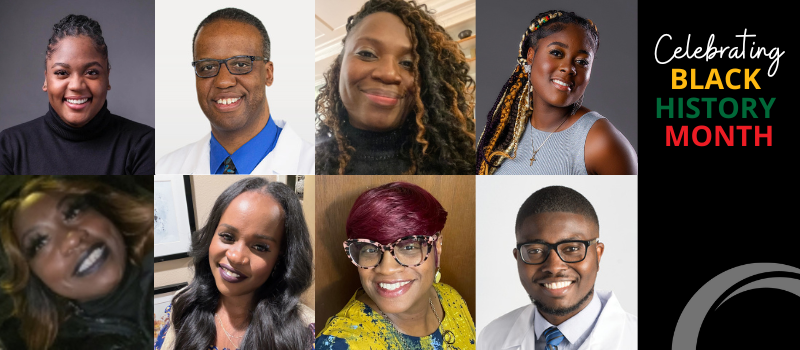Overlake Staff Share Reflections on Black History Month
Black History Month, observed annually in February, provides an opportunity to celebrate the rich traditions and achievements by African Americans and a time for recognizing their central role in American history. To honor this month and recognize the year-round impact of our African American team members, we spoke with Overlake staff about their reflections on Black identity, the importance of diversity in healthcare, and how representation fosters better patient outcomes.

What does your Black/African/African American heritage mean to you?
- My heritage means everything to me. It is the core of my being. Knowing that I come from a rich cultural background has always been a thing of pride, joy and a source of strength. – Olabode Akinsanya, MD
- To be Black in America is to carry a heritage of resilience, creativity and unyielding strength. It is to exist within a history of triumphs and struggles, where every step forward represents the sacrifices of those who came before. My Black heritage is a legacy of pride, grounded in the understanding that my ancestors endured unimaginable hardships yet forged paths for my opportunities today. – Joslande, RN
- Black culture is rooted in the historical experiences of African people and their descendants, including the legacies of slavery, colonialism and the civil rights movement. It celebrates the resilience, strength, and achievements of Black individuals and communities throughout history. – Donniella, Surgical Technologist
- My heritage is a very important aspect of my life that defines me. I have been blessed with many older family members who have been able to help me further understand my heritage and how it defines me today. – Edward Leonard, MD
- Be proud of yourself, your name and your history! Walk with your head high and know you can accomplish anything you put your mind to. – Lashaunda, administration team member
- My heritage means resilience; holding so many unique traditions and history has pushed me always to reach my fullest potential and never limit myself. – Candace, Surgical Technologist
- My heritage means the world to me, because it is a very unique heritage which welcomes everyone. – Anastacia, Surgical Technologist
Is there something you wish people knew more about your culture or racial identity?
- Although our experiences are different from others in society, we have the same values and desires as others. We also have much to give to others through our life experiences that can enrich other people. – Edward Leonard, MD
- I am Haitian American. This is something I want people to know about Haiti: Haiti made history by becoming the first independent Black republic in 1804 after a successful revolution against French colonial rule. This revolution, led by figures like Toussaint Louverture and Jean-Jacques Dessalines, was the first and only successful slave revolt in history to establish a free nation. – Joslande, RN
- There is more to each person than the general term African American. We each have our origin. We have a tribe and a clan that has its own traditions, beliefs, rituals and language that makes us unique. We are not a violent people. We are just people who have been forced to fight through time for the survival of our race. – Mary, Surgical Technologist
- Black culture emphasizes community. It encompasses collective values, traditions and social structures that promote unity, mutual support and resilience in the face of adversity. – Donniella, Surgical Technologist
Why do you think diversity and inclusion in the healthcare workforce are important?
- Having providers and other caregivers that look like them will give the patient a sense of comfort knowing that their healthcare needs will be closely monitored and met. – Edward Leonard, MD
- Diversity and inclusion in healthcare are essential because everyone has different experiences and biases. When we take the time to understand others’ perspectives and life experiences, we can provide more compassionate, effective and equitable care. – Joslande, RN
- Diversity in the workplace helps not only healthcare workers understand the diverse races they serve, but also fosters respect and understanding among coworkers from different cultural and racial backgrounds, reducing the likelihood of misunderstandings and offense. – Donniella, Surgical Technologist
- Diversity in healthcare is very important. It creates an avenue for people with diverse backgrounds to share a common space, learn from one another, and in doing so, understand their respective cultural differences. Patients will ultimately benefit from this by getting care from caregivers who look like them or at least one who is culturally aware of their unique situations. – Olabode Akinsanya, MD
How do greater diversity and inclusion affect the patient experience?
- As family physicians, we are the gatekeepers of the healthcare system. Representation can help ease patients into their use and trust of healthcare establishments. This, in turn, helps physicians obtain reliable histories, arrive at the appropriate diagnosis, and come up with a great plan of care. – Olabode Akinsanya, MD
- When patients see people who look like them, they may feel comforted in knowing that they will be heard. And that the care provider can possibly relate to their situation. – Donniella, Surgical Technologist
- Greater diversity and inclusion improve the patient experience by ensuring people feel seen, heard and understood. When healthcare providers truly see a person—acknowledging their background, experiences and needs—they can offer more personalized, effective and compassionate care. – Joslande, RN
- By providing knowledge and experiences to patients that could provide them greater insight into others as well as their own healthcare. – Edward Leonard, MD
- They feel seen and heard and can trust the healthcare system is listening and giving their best efforts to provide the best care possible. – Candace, Surgical Technologist
What led you to pursue a career in healthcare?
- I have a great interest in science, and at an early age, a realization that I wanted to help people. I have also had experiences with two of my aunts and a cousin who were all nurses. – Edward Leonard, MD
- My parents—my mother fighting ongoing health issues since I was young and losing my father to cancer—has inspired me to pursue a career that allows me to help others that face the known and unknown. – Candace, Surgical Technologist
- I have always nurtured the idea of helping people. One way of doing that was to be a physician. – Olabode Akinsanya, MD
- Helping patients gives me happiness and that is why I'm in healthcare. – Lashaunda, administration team member
- My Mother, who volunteered at a retirement home, decided she wanted to take a Certified Nursing Assistant (CNA) class. She challenged me to take the class with her and that’s how it began. – Donniella, Surgical Technologist
What are your views regarding health disparities among Black Americans? What more could be done to address some of these issues?
- One crucial step to reducing healthcare disparities is listening without judgment. Too often, Black patients are labeled noncompliant before their histories and experiences are understood. Healthcare providers must take the time to learn about generational trauma, systemic barriers, and lived experiences to build trust and provide care that is truly equitable and compassionate. – Joslande, RN
- The answer is straightforward: dedicating time to intentional listening and ensuring patients possess a clear comprehension of their condition, along with accessible treatment options. Treat them like you would want to be treated. – Donniella, Surgical Technologist
- There are great disparities in healthcare for Blacks in this country in many health areas. There is movement occurring to improve these differences, albeit slowly. The biggest thing to be done (beyond doing the actual work) is to identify and bring light to the differences. – Edward Leonard, MD
- Advocacy needs to continue to be implemented though we may not all look alike, and are on different walks of life, standing up for each other makes more progress than turning a blind eye because it is not you. – Candace, Surgical Technologist








